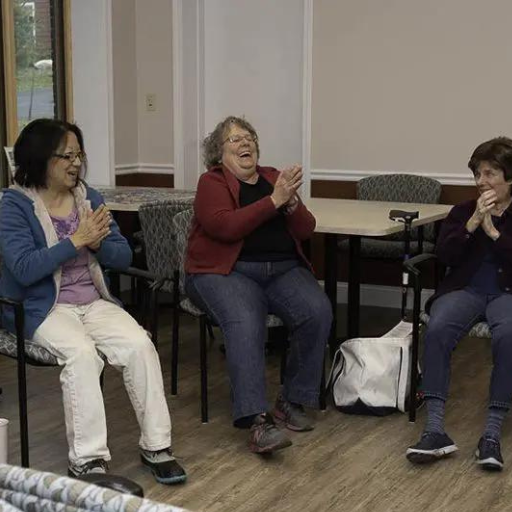Neuroscientists know that laughter really is a great medicine.
Sustained social laughter draws us together in ways that not only lighten the mood but strengthen the immune system, diminish pain and protect us from the effects of stress.
Despite its name, Laughter Yoga sessions don’t look much like traditional yoga. The “yoga” is the connecting of body, mind and spirit as participants pantomime, tell jokes in gibberish, make animal
sounds or otherwise engage in giggle-inducing silliness – and do some breathing exercises and maybe some light stretching or gratitude exercises.
“There’s research that shows that this kind of practice can give the same sort of release as opioids,” says Andrea Tolbert, a social worker who leads a Laugh Saturday Yoga Club in Portland. “This kind of effect only happens with sustained laughter – a good 15 or 20 minutes.”
A medical doctor named Madan Kataria from India founded the practice of Laughter Yoga in 1995, and since then Laughter Yoga clubs have popped up all over the world.
“It’s sometimes described as an internal jog,” says Denise Macaronas, who leads a free lunchtime class in Falmouth on the third Wednesday of each month.
“The whole philosophy is laughing for no reason at all. Our body can’t tell whether you are truly laughing or intentionally laughing, and there are benefits. It releases endorphins – feel-good hormones – and it’s better to laugh in a crowd because it’s contagious. We need more youthful playfulness in our lives.”
Denise’s classes include telling “jokes” in gibberish – to avoid language that might be hurtful or sarcastic. Animal sounds are also welcome. “Sometimes we pretend we have a big cauldron in front of us, and we can throw our troubles in there,” Denise says. “If you don’t want people to know what your troubles are, you can do it in gibberish.”
Amanda Walden, a trained Laughter Yoga leader from Bath, teaches classes on demand for crowds as varied as a chronic pain support group, a girls’ soccer team and corporate events. She leaves out the gibberish and adds gratitude exercises to the mix of silliness. She’s been known to ask people to play toilet paper tug-of-war – that is, try to make it look realistic without breaking the toilet paper.
We need more youthful playfulness in our lives.
“It’s a blend of positivity, laughter, gratitude and breathing exercises,” she says. “It’s silly, and you have to give yourself permission. It’s a great people connector, and you might see somebody from Laughter Yoga class when you’re out and look at each other and giggle.”



